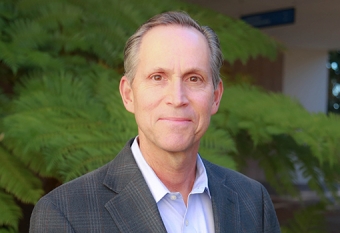
Two UC Santa Barbara College of Engineering professors, Linda Petzold and Glenn Fredrickson, have been elected to the National Academy of Sciences in recognition of their distinguished and continuing achievements in original research. Membership in the NAS is one of the highest honors given to a scientist or engineer in the United States. This year, the academy elected 120 members and 30 international members.
“We congratulate professors Linda Petzold and Glenn Fredrickson on this highly prestigious recognition and honor from their peers,” said Rod Alferness, dean of the College of Engineering. “Their election is a tribute to their sustained groundbreaking research, which both demonstrates exceptional scholarship and has a high impact in the areas of numerical analysis and mathematical modeling, and soft-matter theory, respectively. The UCSB community is extremely proud of this well-deserved recognition for their critical contributions to science.”
Fredrickson, the Mitsubishi Chemical Chair in Functional Materials, was honored by the NAS for his contributions to soft-matter theory. He pioneered computational field theory techniques that revolutionized the study of soft materials and complex fluids, most notably in self-assembling polymers and block copolymers. Known as field-theoretic simulations (FTS), his techniques have a number of advantages relative to traditional simulation techniques for studying the equilibrium structure and thermodynamic properties of complex fluids and polymers. Unlike particle-based simulations, his method becomes more efficient as the density of the system increases, or the polymers become longer. Fredrickson’s techniques are significant not only for their importance to molecular thermodynamics, but also for their engineering impact on directed self-assembly, an important technology for manufacturing semiconductor devices. His research spans soft-condensed matter physics, theoretical and computational chemistry, materials science, and chemical engineering.
“Election to the NAS is the highest recognition for scientists in the U.S., so I am thrilled and humbled that my research has been honored in this manner,” said Fredrickson, whose previous awards include the Material Theory Award from the Materials Research Society, the William H. Walker Award from the American Institute of Chemical Engineers (AIChE), and the Polymer Physics Prize of the American Physical Society (APS). He was previously elected a member of the National Academy of Engineering (NAE), and as a fellow of the AIChE, the American Academy of Arts and Sciences, the American Physical Society, and the AAAS. “While my applied research has been previously honored by election to the NAE and awards from the AIChE, it is extremely satisfying to be recognized for my fundamental accomplishments by peers in the scientific community.”
Petzold, the Mehrabian Distinguished Professor of Mechanical Engineering and Computer Science, was honored by the NAS for her contributions to theoretical numerical analysis. A member of the prestigious National Academy of Engineering, she is also an elected fellow of the American Institute for Medical and Biological Engineering (AIMBE), the Society for Industrial and Applied Mathematics (SIAM), the Association for Computing Machinery (ACM), and the American Association for the Advancement of Science (AAAS).
“I am deeply honored that my work has been recognized by my esteemed colleagues in the NAS,” said Petzold. “Up to this point, my work has been recognized mostly for its contributions to computer science and engineering. It is gratifying to be recognized for my contributions in mathematics and the sciences.”
Petzold has been acknowledged widely for her impactful work on mathematical modeling and computational simulation in a wide variety of disciplines and applications. Her breakthrough 1982 paper “Differential-Algebraic Equations (DAEs) are not ODEs [ordinary differential equations]” opened up a new subfield in computational mathematics, and her public-domain software DASSL has enabled the simulation of countless systems in engineering and science. Her LSODA software has been used extensively and remains in widespread use, particularly in the chemical and pharmaceutical industries. More recently, her work has focused on algorithms and software (StochSS Live!) for discrete stochastic systems, motivated by the need to model the inherent randomness of biochemical reactions in the cell. Current collaborations range from biology (jet lag and cell polarization), to medicine (trauma and chronic pain), to ecology (ant behavior), to neuroscience (learning, neuronal networks, and migraine).
“My work has greatly benefitted from the collegial, stimulating, and highly multidisciplinary environment at UCSB,” said Petzold. “I am deeply grateful to my collaborators for sharing their research adventures, and to my colleagues and the UCSB administration for their vigilance in protecting and maintaining an environment that is highly conducive to research.”
Those elected this year bring the total number of active NAS members to 2,461 and the total number of international members to 511. The NAS is a private nonprofit institution established in 1863 by a congressional charter signed by President Abraham Lincoln. It recognizes achievement in science by election to membership, and with the National Academy of Engineering and the National Academy of Medicine, provides science, engineering, and health policy advice to the federal government and other organizations.



